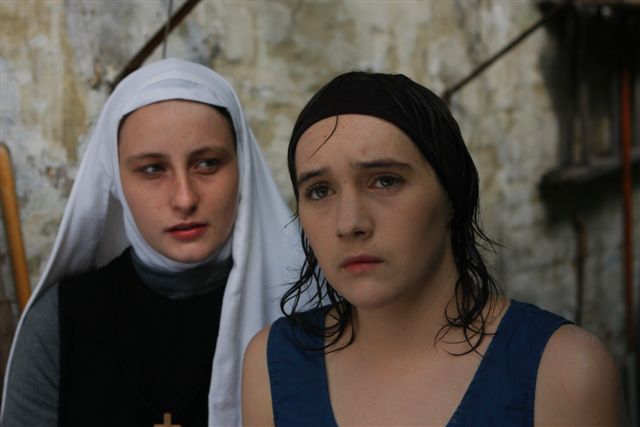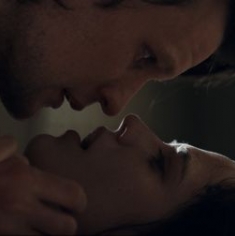
Although I arrived to the Haifa Film Festival a bit late, this year’s festival has so far been delightful, with good movies and a great open and engaged buzz surrounding the various screenings and events. There is a lot of discussion going on about the various movies, particularly those that might be defined as ‘festival films’; films that are deliberately paced, introspective, existential, often with spare soundscapes and open endings. These are the films that are Bressonian masterpieces to their fans and slow, boring, dumb, vacuous bits of pretension to their detractors. In the past couple of days, two such movies have come up in discussion more often than any other: Benedick Fliegauf’s ‘Womb‘ and Bruno Dumont’s ‘Hadewijch‘.
Sure enough, it didn’t take long for the ‘festival film’ discussion to materialize. I found ‘Womb‘ to be a terribly constructed, boring piece of trivial ineptitude. I found ‘Hadewijch‘ to be a beautiful, bracing, marvelous work. ‘Womb‘s many fans assure me it is everything I found ‘Hadewijch‘ to be, and vise-versa. These discussions are spirited and interesting, but always end at the same point: One of us connected to the film, the other did not. These are the hardest and most futile films to argue about, as they seem to be the most subjective. How much of an argument can there be when people disagree about not only the essence of a film, but how it goes about it?
The thought has been nagging at me for the past couple of days- there are standards to good filmmaking, and there are objective facts to be considered when thinking about a film. Liking or disliking a film is all well and good, but what can one do with a film where, if someone disagrees, it is most often because they saw the exact opposite of what you did? The thought remains unresolved, but I felt it incumbent upon me to share it before going into these films. I am sure of what I experienced with these films, and I’m convinced that ‘Hedwijch‘ is a very good film and ‘Womb‘ a very bad one, yet I’m somewhat unsettled by the fact that, with these films, making a connection or failing to do so seems to overwhelm any objective standards one can put in place.
* * * * * * *
‘Hadewijch‘ is clearly the work of a provocateur. Bruno Dumont -who was last at the festival with in 2006 with ‘Flanders’, which won the Golden Anchor- has made a film that, in exploration of religious obsession, comes to the conclusion that Catholic single-minded devotion to Jesus Christ and Muslim devotion to Allah can be one and the same. This powder-keg of an idea has enraged many Catholics in Dumont’s native France, but it is more complex than it may initially seem.
Late in this film, there is a dramatic event, one which seems inevitable, yet is never the less devastating. It is a natural and effective ending point for a polemic about religious fanaticism. But the film doesn’t end there. It goes on for a few more minutes, throwing into question the real meaning of the journey that the film’s main character takes. These last scenes are hardly conclusive, but at the very least reinforce the sense that this is not a simple movie about bad religion. An image early on lets us in on Dumont’s complex vision- in one of the first scenes in the film, our Hadewijch, our protagonist, is in her room, praying on her knees. In the window, there is a suspended load of construction material. Although we know it’s suspended from a crane for the construction site below, the pile of metal suspended mid-air outside Hadewijch’s window gives the image tremendous tension. Precisely when Hadewijch finishes her prayer, the load lifts out of the window frame. She may be extreme, but with this image, Dumont signifies that her prayer did in fact take a load off. Misguided or not, Hadewijch’s faith is concrete.
Hadewijch’s faith is so concrete, that even the nuns think she’s being excessive. After she refuses to eat in order to torment her body for Christ, she is asked to leave the convent. “There is no need to cut off the world to be closer to god” says the mother superior, and Hadewijch returns home, dropping her moniker and returning to her original name, Céline. Céline takes the mother superior words to heart, and quickly finds a friend in Yassine, a young Muslim man she met at a cafe, who in turn introduces her to his brother, Nassir. Nassir is a devout Muslim, who in addition to guiding theological study groups, believes in Jihad for the sake of Allah. The impressionable Céline, who has devoted her life to Jesus Christ (“mon a’mour” she calls him), is very taken with this fanaticism and allows Nassir to be her spiritual guide.
The film’s framing is elegant and precise, often making the background just as interesting and important as the foreground, with even the most beautiful shots driving the film’s story (no mere “mood” shots). Playing Hadewijch/Céline is newcomer Julie Sokolowski, who does a tremendous job with the extremely difficult role. With a face out of the silents, Sokolowski allows us to care for and sympathize with this extreme character, who is open and nice, but follows her religious fervor to shocking extremes. She is the center of this film, which, although frustrating in Dumont’s refusal to give answers at the end, is a mesmerizing work of art.
* * * * * * *

‘Womb‘ takes an intriguing science-fiction conceit, combines it with one of the oldest and holiest of taboos, and comes up with a film that is less interesting than its own synopsis. In a nutshell, the film is about a girl named Rebecca and a boy named Thomas who become close friends over a summer when they’re 12, until Rebecca flies abroad with her family. 13 years later, she comes back and has a precious few days with Thomas before he is killed in a traffic accident. She decides to have him cloned, and that she will carry the clone, give birth to him, and raise him. A rather outrageous premise, but between cloning and incest, it does give one pause.
As implied earlier, I found this film to have all the flaws of a bad festival film, although it does manage some memorably outrageous scenes that break through the misguided artsy sludge. It may have been better if it weren’t in English, as it probably would seem more aloof. As it stands, it is woefully alive, doing its best to achieve its dubious goals (some festival films don’t seem to care, but this film tries to ingratiate itself). I felt like this film did nothing right. It feels like a concrete film, but tries to add importance by attempting to give it allegorical elements. Rebecca, played by the talented Eva Green (wonderful in ‘The Dreamers’, ‘Casino Royale’ and ‘Kingdom of Heaven’, less so here), is utterly single minded, has absolutely no life outside of obsessing over Thomas played by relatively unknown Matt Stone (who does not distinguish himself with this poor part). She is very sketchy throughout the film, which has very big time lapses, which would seem to imply allegory…if only her scenes and dialogue weren’t so prosaic. Director Benedick Fliegauf tries to add weight and heft with long, pretty shots of mournful overcast views, but these are just part of a vacuous attempt at beefing up weak storytelling.
Even putting ineffectiveness of the presentation aside, the treatment of the film’s themes is ineffective and nothing new under the sun. When it comes to cloning, it makes the dire error of treating it as a real issue, as opposed to the theoretical one it is right now. There are many practical issues regarding cloning, but a woman giving birth to her own lover is merely sensationalistic. Regarding cloning, this film has little to add to the discourse that ‘A.I.’ hasn’t already touched, and it has no theories about incest. That’s a good thing, but it once again shows the film to be merely sensationalistic. From every angle, ‘Womb’ is simply not a good film at all.
SHLOMO PORATH





